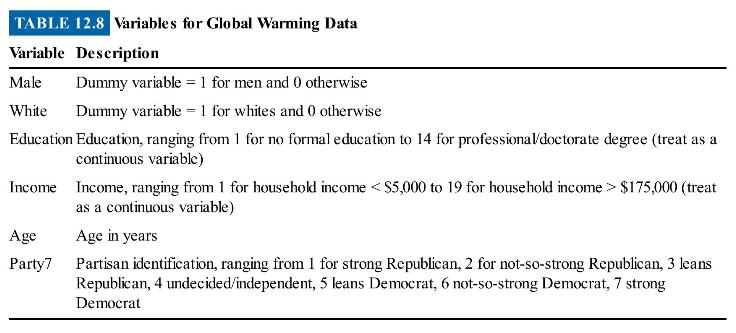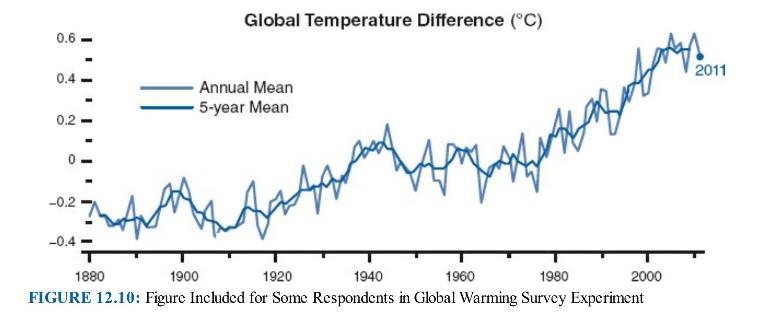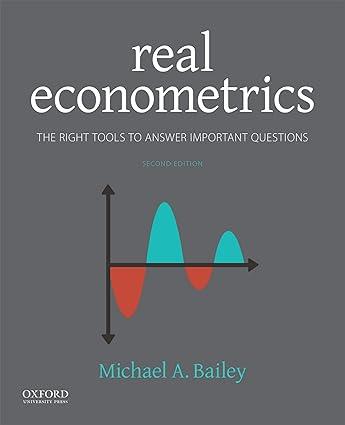Public attitudes toward global warming influence the policy response to the issue. The data set EnvSurvey.dta provides
Question:
Public attitudes toward global warming influence the policy response to the issue. The data set EnvSurvey.dta provides data from a nationally representative survey of the U.S. public that asked multiple questions about the environment and energy. Table 12.8 lists the variables.

(a) Use an LPM to estimate the probability of saying that global warming is real and caused by humans (the dependent variable is HumanCause2). Control for sex, being white, education, income, age, and partisan identification.
(i) Which variable has the most important influence on this opinion? Why?
(ii) What are the minimum and maximum fitted values from this model? Discuss implications briefly.
(iii) Add age-squared to the model. What is the effect of age? Use a simple sketch if necessary, with key point(s) identified.
(b) Use a probit model to estimate the probability of saying that global warming is real and caused by humans (the dependent variable is HumanCause2). Use the independent variables from part (a), including the age-squared variable.
(i) Compare statistical significance with LPM results.
(ii) What are the minimum and maximum fitted values from this model? Discuss implications briefly.
(iii) Use the observed-value, discrete-differences approach to indicate the effect of partisan identification on the probability of saying global warming is real and caused by humans. For simplicity, simulate the effect of an increase of one unit on this seven-point scale (as opposed to the effect of one standard deviation, as we have done for continuous variables in other cases). Compare to LPM and "marginal-effects" interpretations.
(iv) Use the observed-value, discrete-differences approach to indicate the effect of being male on the probability of saying global warming is real and caused by humans. Compare to LPM and "marginal-effects" interpretations.
(c) The survey described in this item also included a survey experiment in which respondents were randomly assigned to different question wordings for an additional question about global warming. The idea was to see which frames were most likely to lead people to agree that the earth is getting warmer. The variable we analyze here is called WarmAgree. It records whether respondents agreed that the earth's average temperature is rising. The experimental treatment consisted of four different ways to phrase the question.
- The variable Treatment equals 1 for people who were asked "Based on your personal experiences and observations, do you agree or disagree with the following statement: The average temperature on earth is getting warmer."
- The variable Treatment equals 2 for people who were given the following information before being asked if they agreed that the average temperature of the earth is getting warmer: "The following figure [Figure 12.10] shows the average global temperature compared to the average temperature from 1951-1980. The temperature analysis comes from weather data from more than 1,000 meteorological stations around the world, satellite observations of sea surface temperature, and Antarctic research station measurements."
 - The variable Treatment equals 3 for people who were given the following information before being asked if they agreed that average temperature of the earth is getting warmer: "Scientists working at the National Aeronautics and Space Administration (NASA) have concluded that the average global temperature has increased by about a half degree Celsius compared to the average temperature from 19511980. The temperature analysis comes from weather data from more than 1,000 meteorological stations around the world, satellite observations of sea surface temperature, and Antarctic research station measurements."
- The variable Treatment equals 3 for people who were given the following information before being asked if they agreed that average temperature of the earth is getting warmer: "Scientists working at the National Aeronautics and Space Administration (NASA) have concluded that the average global temperature has increased by about a half degree Celsius compared to the average temperature from 19511980. The temperature analysis comes from weather data from more than 1,000 meteorological stations around the world, satellite observations of sea surface temperature, and Antarctic research station measurements."
- The variable Treatment equals 4 for people who were simply asked "Do you agree or disagree with the following statement: The average temperature on earth is getting warmer." This is the control group.
Which frame was most effective in affecting opinion about global warming?
Step by Step Answer:

Real Econometrics The Right Tools To Answer Important Questions
ISBN: 9780190857462
2nd Edition
Authors: Michael Bailey




